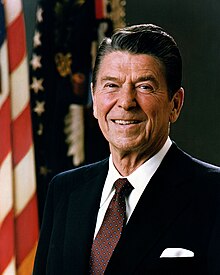
The Kansas Republican Party is the state affiliate political party in Kansas of the United States Republican Party. The Kansas Republican Party was organized in May 1859.

The 2006 California gubernatorial election occurred on November 7, 2006. The primary elections took place on June 6, 2006. The incumbent Republican Governor, Arnold Schwarzenegger, won re-election for his first and only full term. His main opponent was California State Treasurer Phil Angelides, the California Democratic Party nominee. Peter Camejo was the California Green Party nominee, Janice Jordan was the Peace and Freedom Party nominee, Art Olivier was the California Libertarian Party nominee, and Edward C. Noonan was the California American Independent Party nominee.
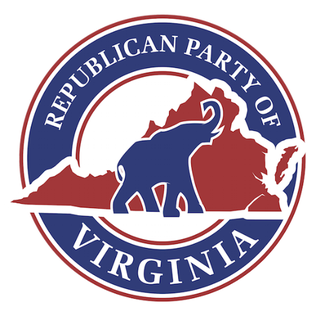
The Republican Party of Virginia (RPV) is the Virginia chapter of the Republican Party. It is based at the Richard D. Obenshain Center in Richmond. As of May 2024, it controls all three statewide elected offices and 5 out of 11 U.S. House seats.

The California Democratic Party is the affiliate of the Democratic Party in the U.S. state of California. It is headquartered in Sacramento, the state capital.

Elections in California are held to fill various local, state and federal seats. In California, regular elections are held every even year ; however, some seats have terms of office that are longer than two years, so not every seat is on the ballot in every election. Special elections may be held to fill vacancies at other points in time. Recall elections can also be held. Additionally, statewide initiatives, legislative referrals and referendums may be on the ballot.

The results of elections in the state of New York have tended to be more Democratic-leaning than in most of the United States, with in recent decades a solid majority of Democratic voters, concentrated in New York City and some of its suburbs, including Westchester County, Rockland County and Long Island's Nassau county, and in the cities of Buffalo, Rochester, Syracuse, Albany, and Ithaca.

The politics of Oklahoma exists in a framework of a presidential republic modeled after the United States. The governor of Oklahoma is both head of state and head of government, and of a pluriform two-party system. Executive power is exercised by the governor and the government. Legislative power is vested in the governor and the bicameral Oklahoma Legislature. Judicial power is vested in the judiciary of Oklahoma. The political system is laid out in the 1907 Oklahoma Constitution.
The Nevada State Democratic Party is the affiliate of the Democratic Party in the U.S. state of Nevada. It has been chaired by Daniele Monroe-Moreno since March 2023.
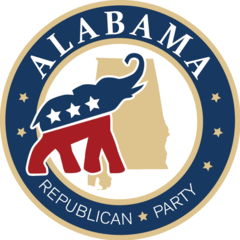
The Alabama Republican Party is the state affiliate of the Republican Party in Alabama. It is the dominant political party in Alabama. The state party is governed by the Alabama Republican Executive Committee. The committee usually meets twice a year. As of the February 23, 2019 meeting in Birmingham, the committee is composed of 463 members. Most of the committee's members are elected in district elections across Alabama. The district members are elected in the Republican Primary once every four years, with the most recent election for the committee having been on June 5, 2018. The new committee takes office following the general election in November 2018. In addition, all 67 county GOP chairmen have automatic seats as voting members. The state chairman can appoint 10 members. Each county committee can appoint bonus members based on a formula that theoretically could add 312 seats, although that formula currently calls for only about 50 seats.
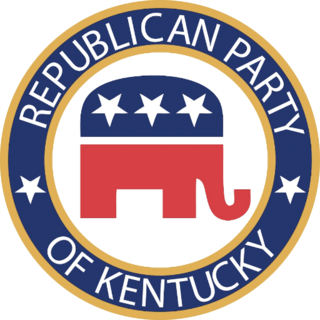
The Republican Party of Kentucky is the affiliate of the Republican Party in Kentucky and follows its nationally established platform. The party's headquarters is in Frankfort, Kentucky.

The Montana Republican Party (MTGOP) is the affiliate of the Republican Party in Montana. It is headquartered in Helena.

The politics of Virginia have followed major historical events and demographic changes in the commonwealth. In the 21st century, the northern region has become more liberal in attitudes and voting, constituting a reliable voting bloc for Democrats and joining with population centers in the Richmond Metropolitan and Hampton Roads areas to dominate the state. Political orientation varies by region, with the larger cities and suburban areas generally voting Democratic and the rural areas voting Republican. The southern, rural regions have remained rural and conservative. Until 2021 when the GOP swept all statewide offices, Virginia was shifting more Democratic and now is considered a swing state again by most pundits.

The 2008 United States presidential election in California took place on November 4, 2008, in California as part of the 2008 United States presidential election. Voters chose 55 electors, the most out of any of the 50 states, to the Electoral College, who voted for president and vice president.
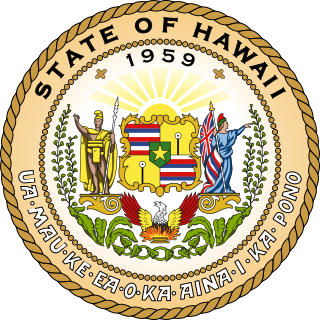
Elections in Hawaii are held for various local, state, and federal seats in the state of Hawaii. Regular elections are held every even year, although special elections may be held to fill vacancies at other points in time. The primary election is held on the second Saturday in August, while the general election is held on Election Day, which is the first Tuesday after the first Monday in November.

The Government of Mississippi is the government of the U.S. state of Mississippi. Power in Mississippi's government is distributed by the state's Constitution between the executive and legislative branches. The state's current governor is Tate Reeves. The Mississippi Legislature consists of the House of Representatives and Senate. Mississippi is one of only five states that elects its state officials in odd numbered years. Mississippi holds elections for these offices every four years in the years preceding Presidential election years.

The California state special elections, 2009 were held on May 19, 2009 throughout the state of California. The elections were authorized by the State Legislature and Governor Arnold Schwarzenegger as a part of a budget signed into law on February 19, 2009. Voters voted on six ballot propositions, 1A through 1F, for the open 26th State Senate district seat, and in a primary for the open 32nd congressional district seat. All of the propositions except 1F were defeated.

Elections in Virginia are authorized under Article I of the Virginia State Constitution, sections 5–6, and Article V which establishes elections for the state-level officers, cabinet, and legislature. Article VII section 4 establishes the election of county-level officers. Elections are regulated under state statute 24.2-102. The Virginia State Board of Elections oversees the execution of elections under state law. In a 2020 study, Virginia was ranked as the 12th easiest state for citizens to vote in.

The 2018 California Insurance Commissioner election was held on November 6, 2018, to elect the Insurance Commissioner of California. Under California's nonpartisan blanket primary law, all candidates appear on the same ballot, regardless of party. In the primary, voters may vote for any candidate, regardless of their party affiliation. The top two finishers — regardless of party — advance to the general election in November, even if a candidate manages to receive a majority of the votes cast in the primary election.

Tennessee state elections in 2020 were held on Tuesday, November 3, 2020. Primary elections for the United States Senate, United States House of Representatives, Tennessee Senate, and Tennessee House of Representatives, as well as various judicial retention elections, were held on August 6, 2020.

The 2022 California State Controller election was held on November 8, 2022, to elect the California State Controller. Due to strict absolute lifetime term limit laws, incumbent Democratic State Controller Betty Yee was ineligible to run for a third term. Democrat Malia Cohen won the election, defeating Republican Lanhee Chen. Despite Chen's loss, the race was the closest of the 2022 elections in California and Chen received more votes than any Republican candidate in the 2022 national election cycle. Chen flipped ten counties, also the most any candidate flipped in California.


